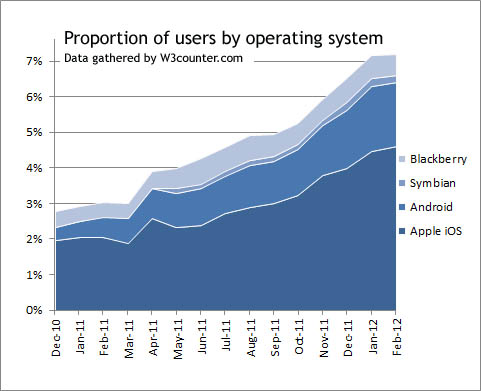By the numbers: Microsoft could still win mobile

At a glance, it seems that Apple's iOS is unstoppable as a leader in smartphone operating systems — but Microsoft's opportunity comes from big- and small-screen integration.
As this first graph shows, the proportion of web pages accessed from smartphones more than doubled last year. According to a sample of data collected by W3Counter, almost 3 per cent of web usage came from a mobile operating system, rising to more than 7 per cent last month. You can see the dominance of Apple and Android, and the low presence of Nokia's Symbian, in this chart.
The dominance of Apple and Android is probably even more pronounced, because the W3 data is based on visits to 55,000 websites — it fails to capture internet usage by apps.

(Credit: Phil Dobbie/ZDNet Australia)
So far, Windows Phone 7 doesn't even rate in the data, but this second graph shows how Microsoft still dominates when it comes to operating systems for desktop and laptops. In particular, Windows 7 has had promising take-up, already surpassing Windows XP and hitting close to double the penetration of the ill-fated Vista. According to these W3 figures, Apple has grown its share, but still only accounts for 9 per cent of the market.
(Credit: Phil Dobbie/ZDNet Australia)
Windows 8, of course, is an operating system that aims to integrate desktop, tablet and smartphone. Rapid take-up of this new system could be a turning point. Microsoft has already shown (with Windows 7) how it can launch a new operating system and grab 40 per cent of the market in just 18 months. A compelling new desktop OS that promises more functionality if replicated on our handheld devices could see Microsoft quickly surpass Apple in the mobile space. After all, it's easier for Microsoft to dominate mobiles than it is for Apple to corner the desktop OS market. When we look at the combination of mobile and fixed devices, Apple accounts for just 15 per cent of the market.
Let's also remember that our relationship with Microsoft in desktops goes back a long way. It's tied to the software and peripherals we use. Our bond with our mobile phone is much more transitory — in fact, most of us expect to move to a different model as soon as our telco contract allows. That leaves the way open for Microsoft to launch a frontal attack on the mobile space, once we've all upgraded to Windows 8.
Don't write off Microsoft just yet. The mobile OS market could look very different in two years.